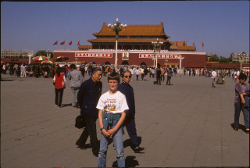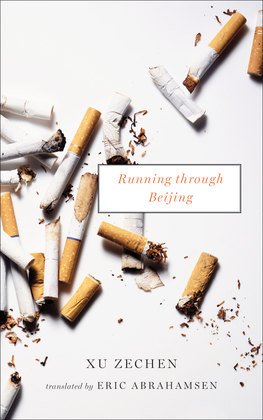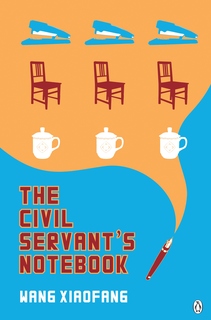Posts
By Eric Abrahamsen, January 13, '08
That’s what you get for an extended vacation: all the fun goes on while you’re gone. I more or less missed a Book Fair (北京图书订货会), being asleep for most of it. The panel discussion by American booksellers sounded particularly interesting. All I’ve been able to find is this series of posts and blog entries by participant Karl Pohrt (of the Shaman Drum Bookshop); while it’s interesting to read his perspective on independent bookselling, I wish there’d been more about what went on in China.
[Edit: I spoke too soon, more posts from Pohrt are going up, take a look.]
The January-Feburary issue of World Literature Today appears to feature a story called ‘Old Stories and New Voices in Beijing’; it’s locked in the land of paper, but if anyone knows what that’s about, please drop us a line.
This highly amusing article about guerilla translation groups in China sports the excellent opener: “The Chinese are by far the best in the world at being numerous.” So true.
I may be late to this party, but I’ve just discovered the elvita威 events listing site for Beijing, and am in hog’s heaven. You always knew there was this much going on in Beijing, you just didn’t know how to get invited to the party. Special recommendation: the Google calendar for literary talks and cultural seminars in Beijing. Oh yes.
It was a long day out but we’re back in the saddle. Expect things.
By Eric Abrahamsen, December 11, '07
The first of Yu Hua's new book, Cries in the Drizzle. I haven't read the original, but this is one of Yu Hua's earlier books, and it sounds as if it might not be his strongest.
The other is of Wang in Love and Bondage, published on the MCLC website. The review is first of all an excellent background on Wang Xiaobo, which is nice, though it's very positive about a translation I just can't understand anyone liking. I hope this book marks the last of the Chinese/foreign translation team efforts – it's just not the right way to go. Still, the review is quite worth reading.
By Eric Abrahamsen, December 10, '07
One of the great mysteries of Chinese to English translation. Mark today on the calendar.
By Eric Abrahamsen, December 8, '07
It appears that John Updike has been officially nominated to tackle Chinese literature for The New Yorker. First there was a dual review of Su Tong's My Life as Emperor and Mo Yan's Big Breasts and Wide Hips in 2005, now an examination of Ha Jin's latest novel, A Free Life. We couldn't ask for a better reviewer (though I suppose we could ask for someone more familiar with Chinese literature).
Apart from Updike's general judgment of the book (neither as focused nor compelling as his other works) a good portion of the review is dedicated to language. Ha Jin is compared to Nabokov and Conrad as a writer who came late to English and achieved, if not mastery of it, at least fluency, and although a charitable reader might prefer to overlook language in favor of the story, Updike doesn't. There's a good reason for that – the book is about immigrants, and in particular the immigrant's struggle to learn the language, but judging from Updike's examples, Ha Jin's own English is slipping as well. Nan Wu, the protagonist, is tripped up by verb modifiers and prepositions (how many Chinese students of English have I heard bitterly cursing prepositions!), while Ha Jin himself is tripped up by awkward usages, inflated metaphors, and turns of phrase that sound to Updike as though they were translations from the Mandarin. I was curious about this last – the example given is "If his wife had been of two hearts with him, this family would have fallen apart long ago", but I can't tell whether this might really have been born as a Chinese phrase in Ha Jin's head.
More…
By Eric Abrahamsen, November 21, '07
I'm reading a book by 张翎 (Zhang Ling), a Chinese writer living in Canada, called Mail Order Bride, and have found two good terms so far. One is 思凡 (sīfán), meaning the longing that an immortal, monk or nun feels for the mortal world, and for the company of the opposite sex. The other is 信达雅 (xìndáyă), which represent the three proper principles of translation as laid out by 严复 (Yán Fù), a famous Chinese translator of the late Qing dynasty. 信 indicates 'fidelity', 达 'fluency', and 雅 'grace'. I was pleased to find this.
By Eric Abrahamsen, November 20, '07
- Paste Magazine carries a review of Ha Jin’s newest novel, A Free Life. It seems he’s turned from writing about China from an expat’s vantage point, to writing about America as an immigrant. But 672 pages…?
- Here’s an interesting twist on the journalist’s obligatory China Book: Beijing Confidential is an account written by the Globe and Mail’s former China correspondent, Jan Wong. Wong is Chinese, an alumnus of Peking University, and during the worst of the Cultural Revolution denounced a fellow student, thereby more or less ruining her life. The book is the account of her visit to China in 2003 to find that student, and make some sort of amends.
- Recently I discovered that Chinese ATMs’ habit of asking you, after you’ve finished your business, if you’d like to ‘Print Advice?’ is not the humorous solecism of someone’s electronic dictionary, but rather something we can blame on the British. It seems that there really are ATMs somewhere in England which presume to pronounce upon your personal life, when all you wanted was a record of your transaction. It doesn’t make any sense to them, either.
- A series of recent articles have gotten me all excited about the future of Chinese literature in Western markets. First was this IHT piece, which begins with Xu Xi and goes on to mention a few of the signposts of growing interest in Chinese writing: HarperCollins’ presence here, Penguin’s acquisition of Wolf Totem, and some quotes from Marysia Juszczakiewicz of Creative Work. Then there was this in the Guardian, berating the British for not reading enough translated fiction. Good! Lastly was Nury Vittachi cheerleading for the Man Asian Literary Prize, though since he’s partially responsible for the establishment of the prize, maybe that’s less a sign of the times.
So everything indicates a literary scene that’s trying hard to go global. The publishers are here, and while they’re mostly still huffing and puffing at the water’s edge, they’ll all eventually work up the courage to jump in. But what about readers? The Guardian article is not, when it comes down to it, terribly optimistic about the odds of foreign literature in the UK, and the US is no better. Publishers getting up the gumption to drop cash on a book doesn’t guarantee a readership, especially when no equivalent sum is spent on marketing. Most tellingly, I saw very little discussion of the Man Asian Literary Prize in mainstream western media, or in the literary websites that link together readers, publishers and the media. Sure, it’s a chicken and the egg problem; sure, it’s an evolutionary process, but I’m wondering if that process won’t be a little slower than I’ve been blithely assuming.
- Can someone confirm that, when typing Mongolian or Tibetan into a computer, you first type in Chinese-looking text like so, and then run it through some processor so that it actually comes out in a Mongolian or Tibetan font? This is most curious.
By Eric Abrahamsen, November 16, '07
In September of 2006 the South China Morning Post ran a profile I wrote of Jiang Rong, the author of Wolf Totem. Given Wolf Totem's recent win (and the fact that the profile is getting quoted in recent news stories) I wanted to reprint that article here.
Wolf at the Door
HOW DOES A book about Mongolian wolves - a book weighted down with complex historical theories, written by an unknown university researcher with a history of trouble with the government - sell a million copies in China? The mainland's best-seller lists are crammed with business manuals and martial arts fantasies. Why is the reading public devouring an old man's recollections of the Cultural Revolution, and his muted call for reform of China's political system?
Wolf Totem - part memoir, part socio-historical treatise - is one of the most popular books in recent memory. Since its publication in April 2004, it's sold more than one million copies legally, and perhaps six times that number in pirated editions. It's spawned a children's version called Little Wolf, Little Wolf, a film adaptation is to be produced by the Forbidden City Film Company, and an English translation is due next year, Penguin having paid a record fee for the rights.
For all Wolf Totem's popularity, next to nothing is known about its author. Jiang Rong is the pseudonym of an economics researcher at a Beijing university, a man who doesn't show up to his own press conferences, who's kept his identities so separate that his university colleagues had no idea he'd written a book.
His anonymity is not entirely voluntary - in conversation Jiang hints at past political troubles that resulted in his being barred from teaching, and from much of public life, for the past two decades. But surely that would also exclude him from publishing books? "At the time they didn't know it was me," says Jiang, a 59-year-old man with piercing eyes and a sly grin. Did that cause him problems once they found out? "Yes", is his only answer.
More…
By Eric Abrahamsen, November 12, '07
Apparently I'm the last to know (I've been asleep all day), but Jiang Rong has taken the Man Asian Literary Prize. Huzzah!
By Eric Abrahamsen, November 9, '07
My previous post on niubi was actually prompted by a bit of reading I’ve been doing: Feng Tang’s 十八岁给我一个姑娘 (which I persist in calling Given a Girl at Age 18, though I think he prefers ‘Chick’). Here’s the first couple pages of the book, which I held on to until after I’d posted on niubi, as a kind of fig leaf for the brazen cop-out at the end of the third paragraph below. Yes, I am ashamed of myself, but I can’t help it.
Zhu Shang
Long before I moved into this building, I’d heard Old Lecher Kong Jianguo talk about Zhu Shang’s mother. Old Lecher Kong Jianguo said that she was his one true passion. The first time I met Zhu Shang I made a decision: I would do everything I could to spend the rest of my life with her.
When you’re only eighteen years old you’ve got no sense of time. ‘The rest of your life’ so often means forever.
More…
By Eric Abrahamsen, November 8, '07
- The New York Sun carries a review of a new book about Marco Polo's travels in China and Mongolia.
- The National Library's project to reprint rare works from pre-Qing times is making progress: they've got a complete reprint of the Siku Quanshu (36,381 volumes) and the Yongle Canon (30,000 volumes), and the Dunhuang Manuscripts and the Zhaocheng Tripitaka are not far behind. If this is what the librarians are spending their time doing, I guess we can shelve our complaints about the impossibility of checking a book out of the library.
- Is it that time of the year already? The 2007 Wealthy Writer's List has been unveiled (English summary here), and the suspense is finally broken. Guo Jingming takes top place with 11,000,000 yuan in royalties, followed by some famous academics and many unfamiliar names. Poor Jia Pingwa comes in last, at number 25. What a waste of time this is. And yet, we link to it.
- Lastly, the Mirror publishes a list of untranslatable words and phrases taken from the book Toujours Tingo, apparently we were too late with our niubi entry. Some of the words really do seem untranslatable ("Tartle - Scottish: to hesitate when you are introducing someone whose name you can't quite remember.", "Pisan Zapra - Malay: the time needed to eat a banana.") others seem to have been chosen just for their weirdness ("Bayram Degil Seyran Degil Eniste Beni Niye Optu? - Turkish: there must be something behind this. Literally 'it's not festival time, it's not a pleasure trip, so why did my brother-in-law kiss me?'")
By Eric Abrahamsen, November 8, '07
…about the Chinese publishing industry, right here. The Arts Council England has published a 300+ page report on the state of Chinese publishing, and its ties to the UK in particular. It's positive, overall, but there's still plenty of gory depictions of an industry deformed and contorted by the conflicting pressures of politics, inertia and market forces. We'll be up late with a flashlight under the covers!
By Eric Abrahamsen, November 1, '07
The Guardian Unlimited's World Literature Tour turned its attention to China a couple of days ago, and we were caught napping. Get over there and tell them what you know about good Chinese literature!
By Eric Abrahamsen, November 1, '07
The idea of ‘untranslatable words’ is very nice. It’s a token of value; it adds a touch of solemn mystery to the work of translation, which otherwise consists mostly of nose-scratching, window-staring, and finding something to weight the book down with. But look, you see? We also have an ineffable something; a tragic ideal; we’re not simply pulling a plow.
Sometimes I think there’s actually such a thing as an untranslatable word, sometimes I don’t. On a good day it seems that any word or phrase could be rendered into English with enough care, even if the word itself vanished and were detectable only through a subtle ruffling of the surrounding text.
But on a bad day, I'm trying to translate níubī.
More…
By Eric Abrahamsen, November 1, '07
The slow pre-Olympics ramp-up continues, now with a lengthy Guardian article on Jung Chang, in which she has harsh words for Mao and China in general. I'll admit that, when I see things like this, I get nervous. It's not that what she's saying is incorrect, but I worry that this is only a warning rumble before the avalanche…
By Eric Abrahamsen, October 26, '07
The shortlist has been announced for the Man Asian Literary Prize: of the twenty-three names on the long list five have been selected, including Jiang Rong (Wolf Totem) from the home team. Xu Xi (Habit of a Foreign Sky) also counts, depending on your definition of, erm, the home team. Wolf Totem, translated by Howard Goldblatt, will be published by Penguin in March, 2008. The shortlist is as follows:
- Jose Dalisay Jr., Soledad’s Sister
- Reeti Gadekar, Families at Home
- Jiang Rong, Wolf Totem
- Nu Nu Yi Inwa, Smile As They Bow
- Xu Xi, Habit of a Foreign Sky
The winner will be announced in November.




